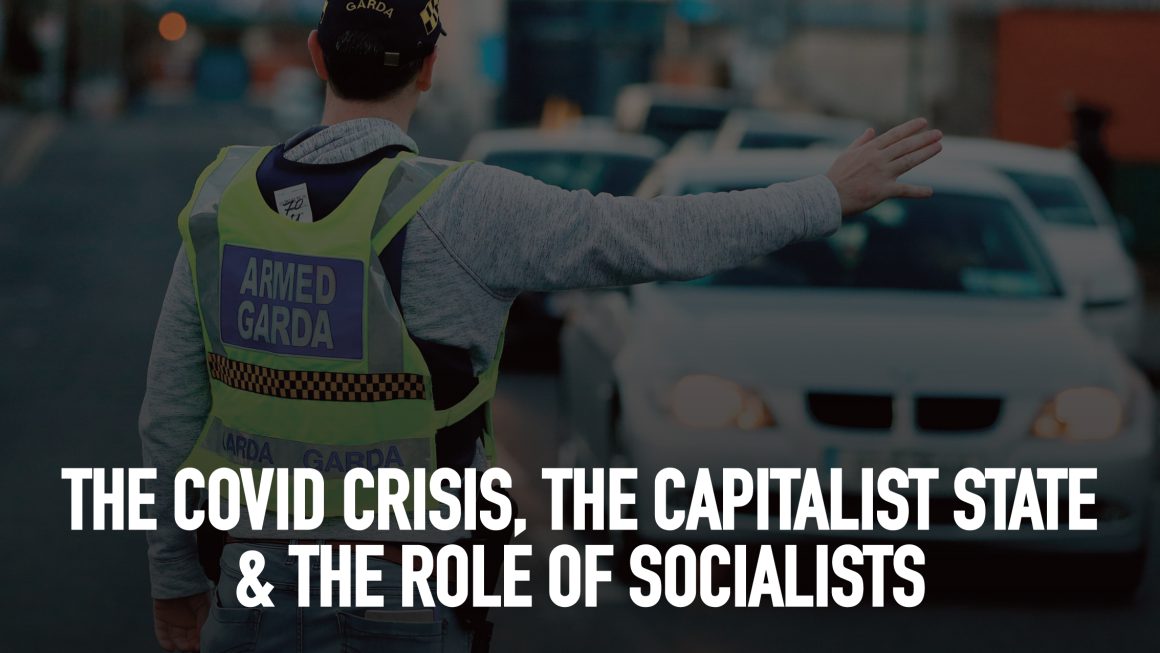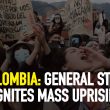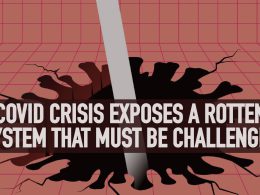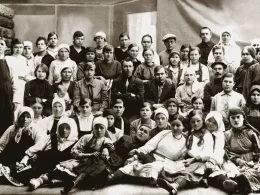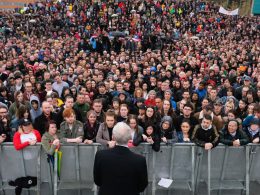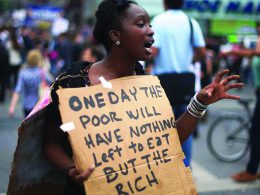By Conor Payne
This article responds to some issues raised by Paul Murphy TD (People Before Profit and RISE) in his recent article ‘The Covid Test’.
For over a year, the Covid crisis has convulsed the world. The virus has killed millions and devastated whole societies, as we are now horrifically seeing in India. The health crisis has been accompanied by massive economic dislocation and social disruption.
The Covid crisis is a capitalist crisis. The ‘’vaccine nationalism’’ of the rich countries means leaving the masses of the neo-colonial world to the mercy of the virus. The capitalists, in Ireland and worldwide, have fought tooth and nail to keep the economy open regardless of the health implications for workers and the general public. While workers have faced mass unemployment, the super-rich have increased their wealth to new record levels and demand for private jets has exploded.
None of this needed to happen. If people’s health was really more important than profit, the world’s vast wealth could be used in a planned way to maintain people economically and every available resource could be successfully directed to the fight against the virus. Capitalism stands exposed as incapable of acting in the interests of the vast majority. The reality of that will be progressively understood in the months and years ahead.
In general, however, the leaderships of the left and labour movement in most countries have not reflected this reality. For example, in Ireland as elsewhere, workers have faced mass redundancies and many employers have repeatedly attempted to force workers to work in unsafe conditions. This has been met with a generally passive response from the trade union leaderships, with no attempt to organise a general resistance.
Worse, when the Debenhams workers took a stand and showed clearly that it was possible for a fightback to be organised, they were not seriously backed and were left to fight alone as far as the leadership of the trade of union movement was concerned, despite the active support of socialist activists and the widespread sympathy amongst working-class people for this battle.This abdication of leadership has made it more difficult for the working class to independently influence events.
However, it does not alter the reality that there is enormous turmoil and change taking place in society. The challenge for the working class is to intervene and try to fashion events so people’s needs wins out over profiteering. The task of the left is to facilitate that and strengthen a developing working-class movement by exposing the need to break with the rule of the capitalist elites, to articulate a socialist answer to the crisis but also to explain how this system can be fought.
A transitional programme on Covid
In his recent article ‘The Covid Test’ (1) Paul Murphy TD of People Before Profit (PBP) and RISE makes a number of criticisms of the approach of the Socialist Party and International Socialist Alternative (ISA) to the Covid crisis. These are very important issues. This crisis has been a test for the left and workers’ movement in Ireland and internationally. We also agree that it has illuminated important differences among some on the left, including between the Socialist Party and PBP and RISE. However, we think the key divergences are very different from what is outlined in Paul’s article. Paul characterises our organisation as putting forward ‘abstract anti-capitalist slogans’, which contrast with the ‘concrete’ programme of PBP and RISE for ‘Zero Covid with socialist policies’.
This is a misrepresentation. Only through a very selective focus on a few articles can it be concluded that the Socialist Party has been issuing abstract propaganda on the Covid crisis.
We have published 164 articles relating to different aspects of the Covid crisis. Throughout our material we have put forward a socialist programme, including on many of the detailed issues which have emerged in terms of restrictions. The vast majority of the concrete demands Paul instances – including nationalisation of private hospitals and a free public health service, Covid taxes on the wealthy, the development of test and trace infrastructure, and the free availability of patent free vaccines – have also been put forward by the Socialist Party.
This was done not only in individual articles, but also in a Ten Point Programme (published on our websites and our journal Socialist Alternative in November) which attempted to put forward key measures to fight the virus and challenge the rule of the capitalist market. (2) Here are just a few examples of demands and proposals which we have put forward during this crisis. There is a lot more which we cannot list here, but they give a sense of the approach we adopted from the outset:
- “Invest in a strategy to fully suppress the virus, with a proper system of mass testing and tracing to detect asymptomatic and undetected cases.” (3)
- “There is a need for real nationalisation of the health service, with democratic public ownership over the private hospitals in this state. In doing so, there should be no compensation of its wealthy owners and institutions. There should also be no going back to the two-tier health system, and instead there should be a single-tier, secular public system, free at the point of use.” (4)
- “The trade union movement must use its authority and weight in society to pressure the Assembly to begin testing on a mass scale. To ramp up the local production of PPE and essential resources, private manufacturing companies must be taken into public ownership and retooled so they are fit for purpose” (5)
- “End the patenting of vaccines to allow for the production of generic vaccines. Take all pharmaceutical labs and production facilities into public ownership under workers’ control and gear them towards assisting with the effort to combat the pandemic” (6)
- “workers should not be forced back to work but should be able to decide democratically what is essential in their own workplaces and across society as a whole. There should also be workers and trade union committees in all workplaces with the power to enforce safety standards during this pandemic… At the same time, the huge solidarity shown by working-class people — including frontline workers — during this crisis points to the possibility of a different way of organising society. Public ownership and democratic workers’ control of the key sectors of the economy is needed to ensure a society geared to the needs of the majority, not the profits of a few.” (7)
It is true that we didn’t describe our approach using the term ‘Zero Covid’, partly because of the potential implications of this in terms of granting sweeping powers to the state, which was central to the Zero Covid policies adopted by certain capitalist states. However, we certainly agreed (and still do) that this virus should be completely suppressed, and opposed the government’s ‘’Living with Covid’’ strategy as “a plan whose logic is that there is an acceptable level of infections and death.” (8)
There is no question of the Socialist Party having been neutral in the face of business-driven demands to reopen the economy. Instead we argued consistently against this approach, advocating instead for the suppression of the virus through the shutting of non-essential economic activity (9). We didn’t advocate only that this be done by the state from above but also put forward the idea of a workers’ shutdown from below – that workers should take strike action where their health is threatened and be backed by the trade union movement (10). We advocated workers’ control of health and safety in the workplace and that workers, not bosses or the government, should decide what work is essential.
Now that restrictions on economic activity are again being lifted, we have again warned of the dangers (11). Despite the vaccination programme being underway, there is still a relatively high number of cases and a potential for the virus to cause serious damage in the weeks ahead.
It is essential to put forward proposals that defend and advance the health, economic and social needs of the working class and young people, as well as putting forward concrete ways a struggle could be waged to achieve these aims. However, any serious struggle for what working-class people need comes up against the incapabilities of the anarchic market where private companies fight each other to maximise profit, and so it is necessary to outline the need for measures which decisively break with this system.
We think that this is the best way to assist people to draw the necessary conclusions that capitalism needs to and can be defeated. This is called a “transitional approach” – one which roots the struggle for socialist change in the concrete needs and struggles of working-class people. Paul describes a transitional approach as “one capable of connecting the current pressing issues of large sections of workers to the need for revolutionary socialist change.”
He cites two articles as examples of RISE’s Zero Covid programme: an article by Diana O’Dwyer ‘Zero Covid Ireland with Socialist Policies’ (12) published on RISE’s website and an article by himself published on TheJournal.ie (13). In both articles, you will find many proposals we agree with and have argued for: defence of the PUP, restoration of the ban on evictions, taxes on wealth and profits, nationalisation of private hospitals etc. Despite Paul’s claims, what you won’t find are any demands or points which expose or explain the need to break with capitalism. There is nothing about the need for democratic public ownership of the key sectors of the economy by the working class, for example. Such a programme should be linked to the need to take over the economic resources so they can be used in a planned way.
This is crucial to articulating and winning people to the socialist answer to the crisis. There are references to ‘socialist policies’ and the ‘socialist future we need’, but with no real explanation of what these mean and no articulation that the proposals outlined were not in themselves enough, or couldn’t be sustained under the existing economic order. So Covid isn’t used to explicitly show that the capitalist system needs to be broken with.
It is not enough to mention the word socialist or socialism. A genuinely transitional approach is only transitional if it actually helps people draw the necessary conclusions – that we need not just a programme of reforms but a struggle which takes wealth and power out of the hands of the capitalist class and their representatives, and into the hands of the working class. Instead what RISE presents are precisely relatively ‘basic demands’ and ‘abstract’ references to socialism. It is ironic that RISE is guilty of the exact mistake that it attributes to the Socialist Party.
Socialists and the State
While Paul seeks to contrast different approaches on the left, he actually minimises the extent of the differences which have developed on the issue of the relationship of socialists to the capitalist state. For Marxists, the state and its repressive apparatus such as the police, the prison system and the military act fundamentally in defence of the capitalist status quo and against the interests of workers and the oppressed. As Engels put it, the state is essentially “armed bodies of men acting in defence of private property.” This has been illustrated on many occasions during this crisis, but in particular in recent weeks as legions of Gardaí were drafted in to force scab labour through the Debenhams picket, despite a level 5 lockdown.
This is why Marxists have historically opposed the granting of new repressive powers to the state: they will inevitably be used against workers and the oppressed. We don’t agree with Paul that “the dangers of additional repressive powers for the state must be weighed up against the dangers of not protecting oppressed or vulnerable groups, or…working-class people as a whole.” The oppressed, the vulnerable and the working class as a whole are the targets of new repressive powers; they are not protected by them.
Such powers are usually acquired with the argument that they are needed to tackle a major emergency or threat: in this state, the ‘Offences Against the State Act’ and the non-jury Special Criminal Court were justified as necessary for fighting terrorism and organised crime. The Covid crisis was no exception, and was used to give governments all over the world extremely draconian powers. This was usually initially accepted by the majority of people given the severity of the crisis, but the warnings about their dangers that the Socialist Party made have since been vindicated.
Of course, opposition to state repression doesn’t mean automatically opposing all new laws but those which clearly strengthen the hand of the state against workers and the oppressed. We don’t think the example given in Paul’s article with No Contact Orders for victims of abuse or harassment has anything much to do with this debate. The issue of transport police is more complex but we supported this demand of the NBRU, issued in the context of attacks on bus drivers, on the basis that the force would not be a part of the Gardaí and would be under trade union supervision. However, the existence of complex cases does not alter the basic principle of opposition to state repression, and such a principle is obviously not compatible with the kind of sweeping emergency powers which capitalist governments took for themselves over the last year.
The left was faced with exactly this question in March 2020 when the government brought in emergency legislation granting the state sweeping emergency powers to fight Covid. It was the biggest extension of state power here in living memory. This included the power to ban protests and all other public gatherings. This was a real test for socialists – the mood was one of ‘national unity’ and there was general support for the measures proposed as being necessary to fight the virus.
Speaking in the Dáil debate, Socialist Party TD Mick Barry said:
“The legislation provides for the most drastic curtailment of civil liberties in living memory… Governments in this country have a long tradition of using repressive legislation for purposes other than its intended use. This has been seen many times with the Offences Against the State Act, which has been used not just against terrorism but against trade unionists, student activists and other campaigners…I support many of the provisions in the legislation but for the reasons I outlined, I am opposed to the overall package.” (14)
Following on from this speech, Mick released an article elaborating his position (15) and put out statements to the media to highlight our opposition. We wrote more developed articles (16) on this vital question on our website too. When it was announced on 8 April 2020 that sweeping powers would be given to the Gardaí in the context of the Covid crisis Mick put out a tweet opposing this (17) and a press statement that said:
“ Solidarity TD Mick Barry this morning voiced his opposition to the sweeping new powers granted to the Gardai to enforce restrictions on public movement. Deputy Barry said that the discipline of the general public has been the key to fighting the spread of the virus and that granting draconian powers to Gardai is neither desirable nor necessary. Under the new regulations Gardaí will have the power to arrest people not complying with restrictions with the possibility of six month jail sentences or €2500 fines… The best way to improve social distancing in the weeks ahead would be to shut down workplaces that are still opening when not in any real sense of word being essential.”
Unfortunately, Mick was not joined in his opposition by any other left TDs. In the aforementioned Dáil debate, Richard Boyd Barrett TD of People Before Profit, which Paul subsequently joined, spoke with a very different message on this question:
“We must give power to our public health system to respond to this crisis. Therefore, we support this legislation. However, it contains some very draconian powers. There must be checks on that.”
This is unquestionably the sharpest divergence which has emerged on the left in the course of the Covid crisis in Ireland and it is very odd that Paul doesn’t refer to it.
At the time Paul also did not oppose this legislation. It is true, as he mentions, that he issued a video in which he stated that he was ‘’concerned that the powers that are given now are not abused and are not extended into the future indefinitely and are not used against workers” and that the powers would be monitored by civil liberties groups and trade unions. However, there was no reason to believe that the powers would be checked in any of these ways and therefore the logical implication would be to explicitly oppose the bill.
Within weeks, the powers in the legislation were used against the picketing Debenhams workers, and they have since been deployed against workers’ protests, the Black Lives Matter movement, ROSA’s socially distanced protests against gender violence and most recently against a taxi drivers’ protest which was due to take place entirely in cars and posed little or no public health threat. The right to protest is now seriously threatened. In March, the Policing Authority reported that the majority of Covid fines had been targeted at young people aged 18-25 and that: “Young people were reported as believing that Covid-19 [has] been used by the Gardaí as an excuse to conduct more stops, to ‘do policing to them rather than for them’ and the point was made that often the ‘wrong young people’ are being stopped which itself creates more resentment.” (18)
PBP have rightly protested against this, but they should recognise that they made a serious mistake in conceding these powers to the government and the Gardaí in the first place.
Instead, the tendency has been to continue the error, in particular in relation to Mandatory Hotel Quarantine (MHQ). This legislation establishes a new network of detention centres which may continue to exist for many years, over which there is no serious oversight and which even grant significant powers to hotel managers. The legislation does not give the right to medical treatment, access to legal advice, access to consular assistance and does not outline minimum facilities.
Mandatory hotel quarantine
This new power is being created in the context of an increasingly racist and authoritarian atmosphere in Europe, where the far right is a serious threat and ‘mainstream’ capitalist governments increasingly echo their policies and approach. From the beginning of the crisis, right-wing forces tried to place the blame on immigrants. Hungary’s far-right Prime Minister declared: “We are fighting a two-front war, one front is called migration and the other one belongs to the coronavirus, there is a logical connection between the two as both spread with movement”.(19) The European Commission’s new migration pact focuses on even further building Fortress Europe and more border guards, boats and infrastructure at the EU’s external borders.
Now, as mass vaccination proceeds in the wealthy countries and the centre of the Covid crisis shifts decisively to the neo-colonial world, there can be even more pressure for draconian policies directed against migrants and in particular people of colour. We need to be extremely conscious of these dangers, and this is another reason we think it is a mistake for the left to support this policy.
It is true, that as with the Covid emergency powers last year, PBP criticised the lack of civil liberties oversight, the privatised model of detention and other aspects of the government’s plan. However, having actively campaigned for its introduction, when it was inevitable that under this state and government the plan would have these characteristics, it doesn’t mean much. The ‘small print’ of a programme can be important but we also have to ask what the real world effects of campaigning and pushing for a policy will be. It is also the case that PBP supported an amendment from the Labour Party that would have widened this regime, in its current form, to more countries.
The justification for their position advanced in Paul’s article serves more to confuse than clarify. Essentially it is that Mandatory Hotel Quarantine is a “crucial component’’ of a Zero Covid strategy and that the alternatives referenced by the Socialist Party – effective home quarantine and no non-essential travel – will not work. Home quarantine under this government has been a ‘’complete failure’’ and “opting for a ban on all non-essential [travel] as an alternative to MHQ in practice would amount to an extended travel ban on people from Africa, Latin America and Asia.”
Clearly it is essential to prevent the virus being brought into the state through travel. However, Paul’s argument raises some questions: if Mandatory Hotel Quarantine is so crucial, why is it not referenced or called for in the key programmatic articles that Paul references? If a travel ban and home quarantine are so problematic, why did he make exactly these proposals as Point 1 of a Zero Covid strategy in his TheJournal.ie article of 21 January 2021:
“Ban non-essential travel into Ireland and implement a mandatory 14-day quarantine period for those who must travel here…The state should provide free quarantine facilities for all who need them, and provide smart monitoring devices to allow people to quarantine safely at home.”
In this formulation, it is clear that hotel quarantine, or quarantine in state facilities, is to be voluntary, which we would support. This was written just a few weeks before our article on this topic which he criticises. It’s fine to change your position of course. But given that the argument of this article is predicated on RISE and PBP’s consistent advocacy of Zero Covid, it should probably be explained how this “crucial component’’ was discovered so late in the game.
This is protesting too much. Paul attempts to present Mandatory Hotel Quarantine as both essential and no different from existing travel regulations, in order to justify what was yet another error in relation to the state and state repression.
What we put forward was not simply the continuation of the existing policy of the government, which was certainly a failure. Instead, we called for free, voluntary hotel quarantine for anyone unable to quarantine effectively at home, for income support and an obligation on employers to provide remote working, for the boosting of resources to assist and check quarantine. (20) We did not call for electronic surveillance, increased police enforcement etc. This was not “abstract propaganda’’ but an attempt to put forward proposals that put the onus on the state and the capitalists to enable people to quarantine, rather than strengthening the power of the state over ordinary people.
In her article on Zero Covid, Diana O’Dwyer says:
“we would obviously not be in favour of compulsory mass testing, militarily-enforced lockdowns or mass surveillance like in China, Australia or South Korea, or any other measure that would interfere with civil liberties and the rights of workers and oppressed groups to organise collectively for their interests. Instead, we would emphasise giving people the economic and social supports they need to voluntarily comply with public health advice. This is backed up by scientific research, which shows that encouraging good behaviour is far more effective than threats of arrest or fines.”
This is basically in line with our own approach. It’s unfortunate that RISE and others on the left have not stuck to it and have tended to bow to demands for more state power under the auspices of fighting the virus.
We think these points about the state are very important and warrant a serious debate across the left and workers’ movement.
Bigger tests to come
Paul’s article concludes: “Marxists have a responsibility not just to make general arguments for socialist change, but to seek to develop a programme and strategy that can actually inspire big sections of working-class people into action to fight for that change.” This is striking because, while Zero Covid undoubtedly has the support and sympathy of many, it has very clearly not moved working-class people into struggle. Nor has the Zero Covid programme of PBP and Rise generally been linked to concrete calls for struggle to achieve its aims. Its emphasis has been on what measures could be introduced by the state, from above.
The past year has not seen a generalised fightback, in part due to the complete passivity of the ICTU leadership. However, we have seen very important struggles and protests by workers, young people, women and people of colour.
Despite the complications, the Socialist Party has sought every opportunity in this crisis to facilitate an active response by working-class people to the crisis which was being visited upon them. These included the launch of a ‘Workers SpeakOut’ page at the start of the crisis, assisting the Debenhams workers to get organised, as well as organising forums of thousands of young people who wanted to fight the government’s attempts to impose a forced Leaving Cert. Of course, none of this has been perfect but we don’t think that any of this speaks to an organisation on the sidelines or engaged in abstract propaganda. Instead, we hope that it serves to demonstrate that a serious intervention among workers and young people is possible while maintaining a principled socialist programme and approach.
We are still in the early phase of a historic capitalist crisis, which will pose both big opportunities and big challenges for socialists. We can only navigate this if we are clear about our role and methods. Maintaining a principled approach to the state and democratic rights, and on other questions, will be crucial. It will also be necessary to develop a programme which thoroughly exposes the inability of capitalism to meet the aspirations of the majority and not to limit ourselves to solutions within a capitalist framework.
Absolutely, we must root this programme in the issues which are impacting the working class and young people. However, we must also clearly explain the need to break with capitalism and reorder society on a completely different and socialist basis. This is the only answer to the burning problems of our society and the only solid basis for left political organisation.
- https://www.letusrise.ie/featured-articles/the-covid-test
- https://socialistparty.ie/2020/11/covid-crisis-exposes-a-rotten-system-that-must-be-challenged/
- https://socialistparty.ie/2021/02/covid-crisis-suppress-the-virus-health-before-profit/
- https://socialistparty.ie/2020/04/end-private-ownership-of-hospitals-with-no-compensation
- https://socialistparty.ie/2020/04/north-we-need-proper-ppe-now
- https://socialistparty.ie/2021/02/covid-crisis-suppress-the-virus-health-before-profit/
- https://socialistparty.ie/2020/04/pressure-mounts-to-re-open-economy-put-public-health-before-private-profit/
- https://socialistparty.ie/2021/02/covid-crisis-suppress-the-virus-health-before-profit/
- https://socialistparty.ie/2020/04/pressure-mounts-to-re-open-economy-put-public-health-before-private-profit/
- https://socialistparty.ie/2020/03/put-lives-before-profit-for-a-workers-shutdown-of-non-essential-services/
- https://socialistparty.ie/2021/04/dont-risk-a-fourth-wave-no-reopening-which-puts-profit-over-health/
- https://www.letusrise.ie/featured-articles/zero-covid-ireland-with-socialist-policies
- https://www.thejournal.ie/readme/zero-covid-strategy-5331482-Jan2021/
- https://www.kildarestreet.com/debates/?id=2020-03-19a.17
- https://socialistparty.ie/2020/03/coronavirus-crisis-say-not-to-attacks-on-democratic-rights/
- https://socialistparty.ie/2020/04/covid-19-no-attacks-on-democratic-rights/
- https://twitter.com/MickBarryTD/status/1247784681287737344?s=20
- https://www.irishtimes.com/news/crime-and-law/covid-19-random-garda-stops-on-young-people-damaging-report-says-1.4512321
- https://www.compas.ox.ac.uk/2020/de-confine-borders-towards-a-politics-of-freedom-of-movement-in-the-time-of-the-pandemic-blog/
- https://socialistparty.ie/2021/02/covid-crisis-suppress-the-virus-health-before-profit/





